Full Text Searchable PDF User Manual

www.brothermax.com
1
Contents
• In this Box
• Important
• Introduction
• Frequently Asked Question’s
• A Bit about Body Temperature
• Ensuring Safe, Accurate Measurements
• Specific Notes for Measuring Forehead Temperature
• General Warnings
• Key to Functions & Screen Display
• Screen Display
• Temperature Range Indicator
• How to Use the Thermometer
• Battery Power and Replacement
• Battery Safety Guidelines
• Product Specification
• Error Messages
• Your Family Members’ Normal Temperature Range
• Further Information
02
02
02
03
05
05
06
07
07
09
10
10
12
12
13
14
15
16
IMPORTANT: KEEP FOR FUTURE REFERENCE

www.brothermax.com
2
In this Box
The packaging box your thermometer came in should have contained:
1 x Digital Thermometer
2 x AAA batteries
1 x User Manual
If any parts were missing please contact Brother Max directly.
Our contact details can be found at the end of this manual.
Important
1.
Before using your thermometer, you should read this manual
thoroughly so that you understand all instructions and follow all
warnings.
2.
This manual is provided for information purposes only.
3.
The product is not meant to be a substitute for the advice
provided by your own physician or other medical professional.
You should not use the information contained herein, or from
this product’s temperature readings, for diagnosing or treating
a health problem or disease, or prescribing any medication. If
you have or suspect that you have a medical problem, promptly
contact your healthcare provider.
4.
For specific information about your own body temperature,
including what measurement is considered normal for you,
CONSULT YOUR PHYSICIAN.
5.
Before doing so - and only if you have done so before the
condition you are consulting a physician about has commenced
- it is likely to help your physician if you have completed the
measuring exercise described in the ‘Your Family Members’
Normal Temperature Range’ section of this manual on page 15.
Introduction
This thermometer takes the temperature of the Body (Forehead) and
Ambient (Room) quickly and accurately.
Body temperature is measured using the heat generated at the surface
of the forehead.
Our thermometer has been developed for optimum comfort, ease and
speed of use and utilises digital, infrared technology to ensure accuracy.
In this manual, ‘ambient’ refers to both inside and outside temperature.
However, because this product is more commonly used inside than
outside, the packaging and manual only refer to ambient mode as
‘room’.
This device has the following advantages:
1. Non-Contact
By placing the probe (ideally) 2-5cm from the forehead, the patient
does not have to be disturbed
2. Fast and accurate
Accurate digital reading to 0.2º in just 1 second
3. Multi-temperature reading
Digitally measures forehead and room temperature
4. Easy to use
Simple function per button, with clear symbols and traffic-light
colour changing temperature range indicator
5. Hygienic and economical
Just wipe clean, no need for probe covers
6. Day or night
Back-lit for easy reading
7. Last Reading Storage
The device stores the previous 19 readings taken to refer back to

www.brothermax.com
3
“Why might I be getting an inaccurate Forehead temperature
reading?”
• The most common causes are:
1.
The probe not being clean; earwax, perspiration, cosmetics, oil,
dust or any other dirt will affect accuracy.
2.
Environmental factors such as exposure to heat or cold. For
example, sitting next to a hot radiator or cold air conditioning unit
will directly affect forehead temperature, and even result in the
temperature on one side of the head being different to the other.
3.
Incorrect setting between Forehead and Ambient modes i.e.
taking Forehead temperature when the thermometer is set to
Ambient mode.
4.
Not allowing 30 minutes to elapse:
• Before taking Forehead temperature when coming indoors
from the cold or hot.
• If a coldpack or hotpack have been used on the head.
• If the thermometer has been stored in a significantly cooler or
warmer environment.
• Comparing a reading from another thermometer that is
calibrated to a different range or format.
“Why can I get different measurements from one forehead
reading to the next?”
• Every time you place the probe on your forehead, it is likely to
be in a different part of your head. Since forehead temperature
is affected by environmental factors such as exposure to heat or
cold, placing the probe on a different part of your forehead can
result in different temperatures especially if, for example, you are
sitting next to a hot radiator or cold air conditioning unit.
• Forehead temperature is also affected by proximity to blood veins,
as an area which has more veins close to the skin will be warmer
than an area that has bone under the skin.
“Why might I be getting an inaccurate Ambient temperature reading?”
• The most common cause of inaccurate Ambient readings is
incorrect setting between Ambient and Forehead modes i.e.
taking ambient temperature when the thermometer is set to
Forehead mode.
“How do I clean wax and other dirt off the thermometer probe?”
• Clean the probe by very gently wiping it with, ideally, a cotton
swab moistened with alcohol or a very soft cloth moistened with
alcohol. Alternatively a dry cotton swab can be used, or a baby
wipe so long as it is very soft and its water content is not so high
that it is dripping wet.
• Never use an abrasive cloth as it will damage the probe.
• Always allow the alcohol (or moisture) to completely dry out
before taking temperature after cleaning.
“Is it best to measure temperature in the Ear or Forehead?”
• Readings from the ear are always best as you need an internal
reading to get the all-important core body temperature which
measuring the eardrum gives you as it shares blood supply with
the temperature control centre in the brain
1
.
• However many children and adults don’t want to have a probe
put in their ear, either because they just feel uncomfortable with
it, or maybe because they are ill and their ear hurts, so forehead
readings provide a convenient alternative.
1
Netter H F, Atlas of Human Anatomy, Novartis Medical Education, East Hanover, NJ, 1997
Frequently Asked Questions
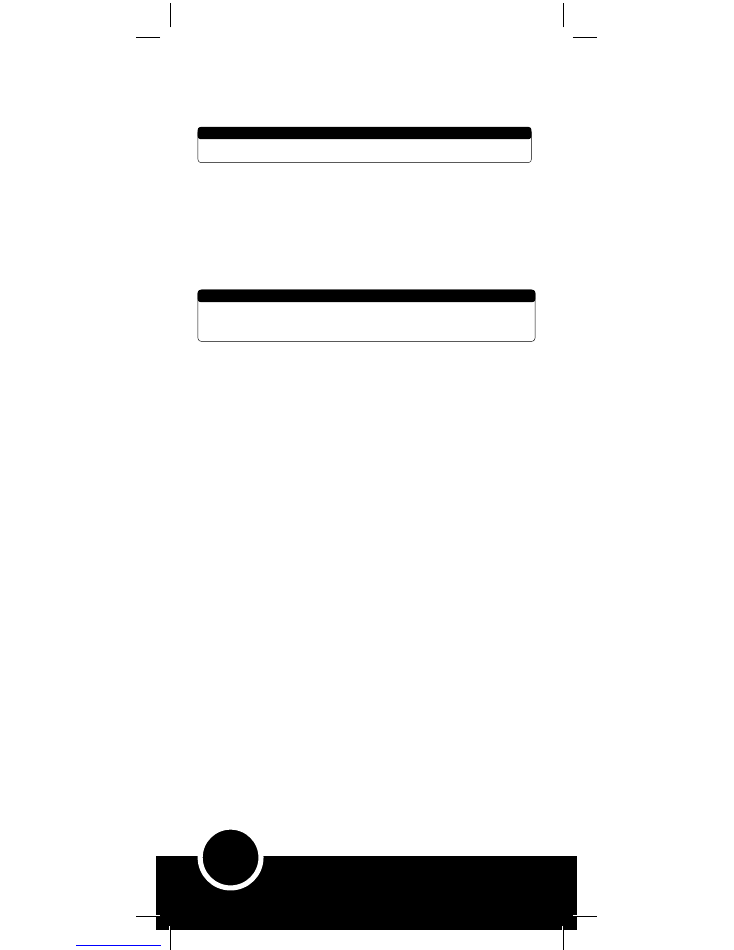
www.brothermax.com
4
“What is the difference between readings from different parts
of the body?”
• Normal body temperature is a range that, as the following table
shows, varies by site
2
:
2
Chamberlain, J.M., Terndrup, T.E., New Light on Ear Thermometer Readings, Contemporary Paediatrics, March 1994.
• Medical research has not yet determined a definitive correlation
between forehead, oral, rectal, ear, and armpit temperature
measurements, which is unsurprising given how different sites
can be so effected by external factors. Many medical practitioners
advise that measurements from different sites should not be
directly compared, however some medical practitioners advise the
following correlation of temperature results based on an average
normal oral temperature of 98.6°F
3
:
3
Jan Nissl, RN, BS, Rectal, Ear, Oral, And Axillary Temperature Comparison, Everyday Health, Inc, April 2007
• Note: When consulting your physician or other medical
professional, advise them that you have measured your forehead
temperature and if possible, the individual’s normal forehead
temperature range (see pg.16).
“Should the Screen light up when the thermometer is in use?”
• Yes, the screen does light up when the thermometer is in use.
The screen’s light automatically turns itself on every time a
measurement is taken, and automatically turns itself off after 10
seconds (to conserve the batteries).
• Please note that the back-light is barely visible in bright daylight.
“Why are the digits sometimes only partly visible when I
first switch the Thermometer on?”
• As the Screen is an LCD (liquid crystal display), the liquid crystals
sometimes need to re-set themselves during the first 10-20
seconds of power running through the screen. So long as all digits
and icons are visible within 20 seconds, and remain visible when
on, this is not a fault.
“What do the different definitions of temperature taking
sites mean?”
• Forehead = temple or forehead temperature
• Tympanic = ear temperature
• Oral = mouth temperature
• Ear = ear canal temperature
• Axillary = armpit temperature
• Rectal = anus temperature
Axillary
2
: Oral
2
: Rectal
2
:
94.5 - 99.1 ºF
34.7 - 37.3 ºC
95.9 - 99.5 ºF
35.5 - 37.5 ºC
97.9 - 100.4 ºF
36.6 - 38.0 ºC
Armpit
temperature
3
: Oral temperature
3
: Rectal temperature
3
:
Ear temperature
3
:
0.5°F (0.3°C) to
1.0°F (0.6°C)
lower than Rectal
or Ear temperature
0.5°F (0.3°C) to
1.0°F (0.6°C)
lower than Oral
temperature.
0.5°F (0.3°C) to
1.0°F (0.6°C)
higher than Oral
temperature.
0.5°F (0.3°C) to
1.0°F (0.6°C)
higher than Oral
temperature.
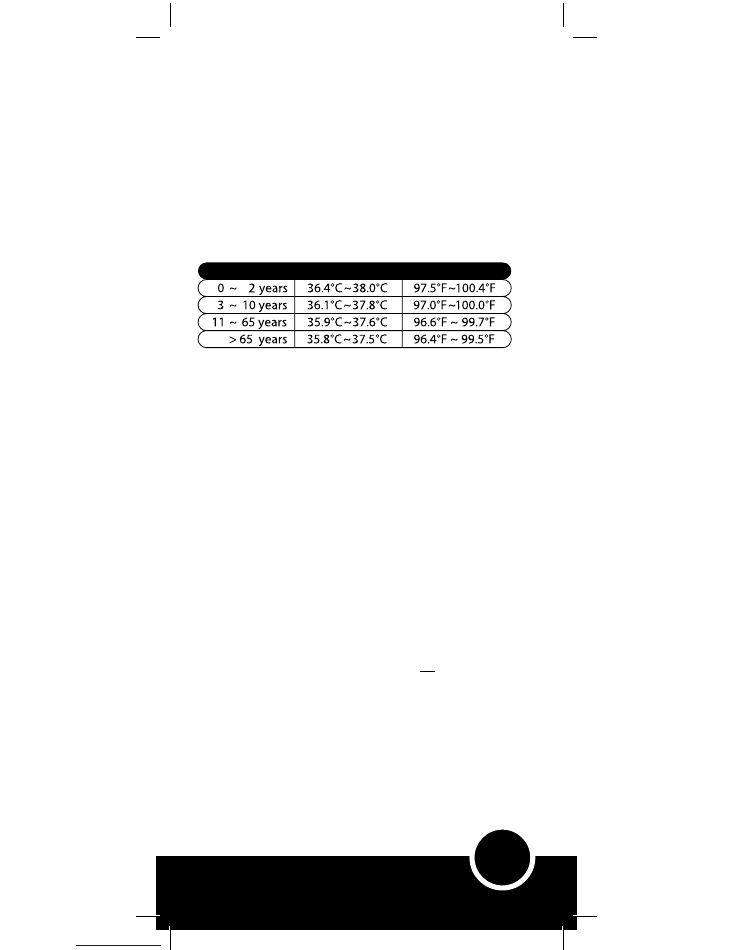
www.brothermax.com
5
A Bit about Body Temperature
Body temperature refers to the internal temperature of the body (also
known as core temperature). ‘Normal’ body temperature
depends on when, where and in whom it is measured. Body
temperature fluctuates in any given 24-hour cycle. It tends to be
lowest in the early morning and highest in the late afternoon. Body
temperature also varies from one body part to another, as well as
amongst different ages, especially under 6 months and over 65 years of
age. Body temperature may also increase as a result of overdressing or
strenuous exercise, especially during hot weather.
Incorrect temperature taking may cause false alarm. There are many
things that can affect your body temperature like extreme activity,
ovulation, pregnancy, smoking and so on.
The following temperature ranges are considered normal:
Information from “Determination of Normal Ear Temperature with an Infrared Emission
Detection Thermometer” by Chamberlain, J.M., MD, and Terndrup, T.E., MD, published in
the Annals of Emergency Medicine, January 1995
Note: Do not self-diagnose. The use of any thermometer is not intended as a
substitute for consultation with a physician.
If the temperature of a child under 6 months old reaches 40.0°C / 104.0°F or more,
consult a doctor immediately. Please note that, as the patient becomes older, this
40.0°C / 104.0°F ceiling actually falls e.g. a 2 year old may need to consult a doctor
immediately if their temperature reaches 39.0°C / 102.2°F.
CAUTION: High prolonged fever always requires medical attention, especially for
young children.
Ensuring Safe, Accurate Measurements
Do not touch the probe and keep it free from perspiration, cosmetics,
oil, hair, dust or any other foreign body as they will affect the accuracy of
temperature measurement.
Clean the probe by very gently wiping it with, ideally, a cotton swab
moistened with alcohol or a very soft cloth moistened with alcohol.
Alternatively a dry cotton swab can be used. Never use an abrasive cloth
as it will damage the probe. Always allow the alcohol (or moisture) to
completely dry out before taking temperature after cleaning.
If there any signs of damage to the lens then please stop using and get
in touch with us (contact details on page 16)
The thermometer is not waterproof so do not place any part of it near liquid.
Note: Never immerse thermometer in liquids.
Do not expose the thermometer to extreme high or low temperatures for
prolonged periods, such as in a particularly hot or cold vehicle or in
direct sunlight.
When taking ambient temperature, please wait 20 minutes before taking
temperature for the probe to acclimatise when moving from one room
to another, and 30 minutes when moving from indoors to outdoors (or
vice versa).
Normal temperature ranges by age

www.brothermax.com
6
Measuring body temperature within 30 minutes of eating, exercising or
bathing can give an inaccurate temperature measurement.
When taking forehead temperature, please wait 30 minutes before
taking temperature to allow body temperature to adjust when coming
indoors from the cold or hot, or if a coldpack or hotpack have been
used.
In either mode, wait 30 minutes before taking temperature if the thermometer
has been stored in a significantly cooler or warmer environment.
When repeatedly taking forehead temperature, take average reading as
small deviations may naturally occur.
If and when informing a medical practitioner of your temperature,
ensure you inform them that you measured forehead and, ideally, what
your normal temperature range is. For help in gaining a more accurate
indication of your own body’s normal temperature range, please refer
to the ‘Your Family Members’ Normal Temperature Range’ section of
this manual.
Specific Notes for Measuring Forehead Temperature
In forehead mode, it is not uncommon for variances in temperature
between different parts of the forehead. This is because forehead
temperature is affected by:
1.
Proximity of the temperature probe to blood veins, since an area
which has more veins close to the skin will be warmer than an area
that has bone under the skin.
2.
To achieve an accurate reading we suggest aiming the probe at the
forehead.
3.
Environmental factors such as exposure to heat or cold.
For example, sitting next to a hot radiator or cold air conditioning unit
will directly affect forehead temperature, and can even result in the
temperature on one side of the head being different to the other.
Use of this thermometer is not intended as a substitute for consultation
with your physician. It is dangerous for any user to self-diagnose and/or
self-treat, even based on the results from this or any thermometer.
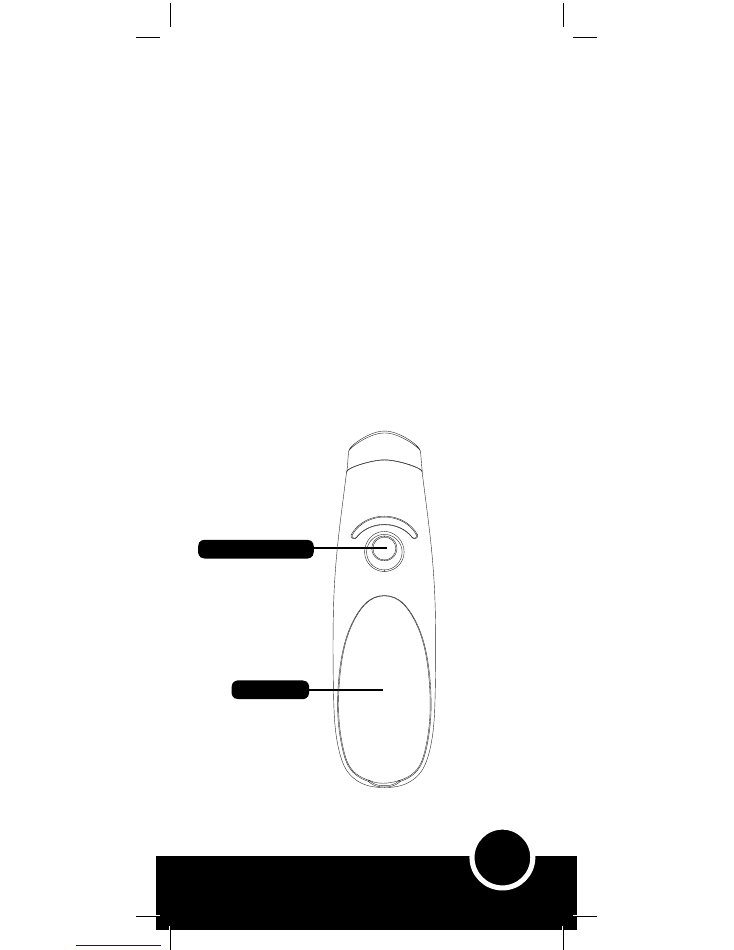
www.brothermax.com
7
General Warnings
Keep the thermometer out of children’s reach.
Immediately consult a doctor if your child accidentally swallows a battery.
Avoid knocking, shaking, dropping or stepping on the thermometer.
In such an event, carefully inspect the device for signs of damage and
immediately return to Brother Max for repair if you suspect any faults.
Do not use a mobile or cordless phone near the thermometer.
Do not disassemble, repair or modify the thermometer.
Do not use this thermometer other than for intended use.
Do not immerse the thermometer in water or any other liquid.
Do not expose the thermometer to direct sunlight.
Store in a clean dry place. Storage limits -20ºC to 55ºC with 95
%
maximum humidity.
Key to Functions & Screen Display
Power ON /Scan button
Battery cover
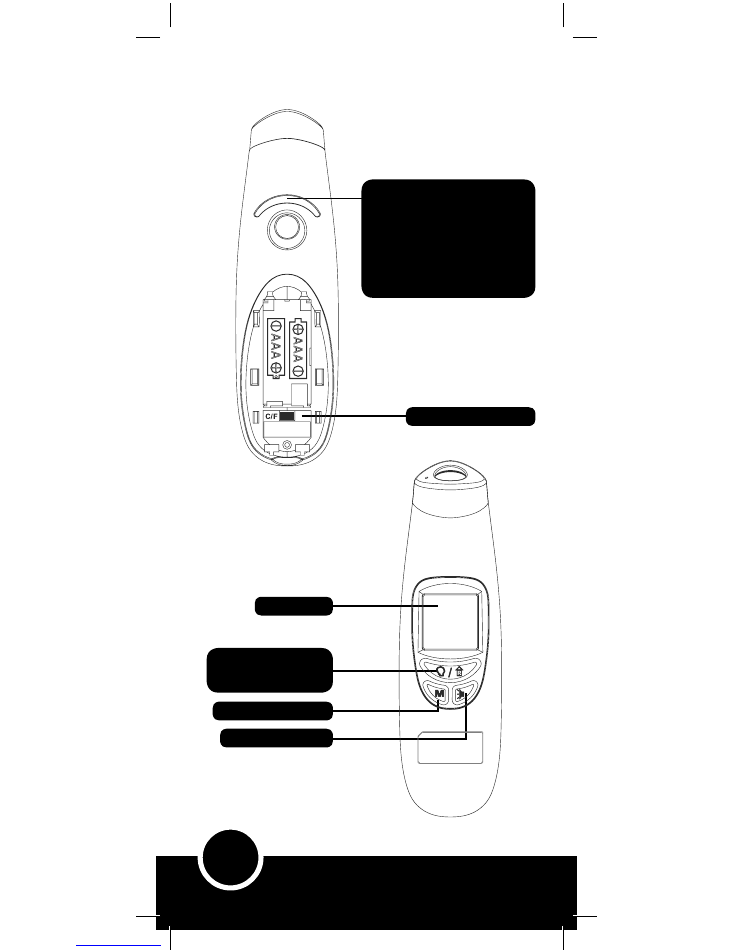
www.brothermax.com
8
Function mode button –
• Forehead (Body)
• Ambient (Room)
Memory function button
Sound ON/OFF button
Screen Display
Celsius/Fahrenheit button
Temperature Range Indicator –
Green / Orange / Red
Green = Normal* temperature range
Orange = Raised* temperature range
Red = High* temperature range
Note: Since the above temperature
ranges are averages, refer to page
5 for normal temperature ranges by age
Key to Functions & Screen Display- Continued
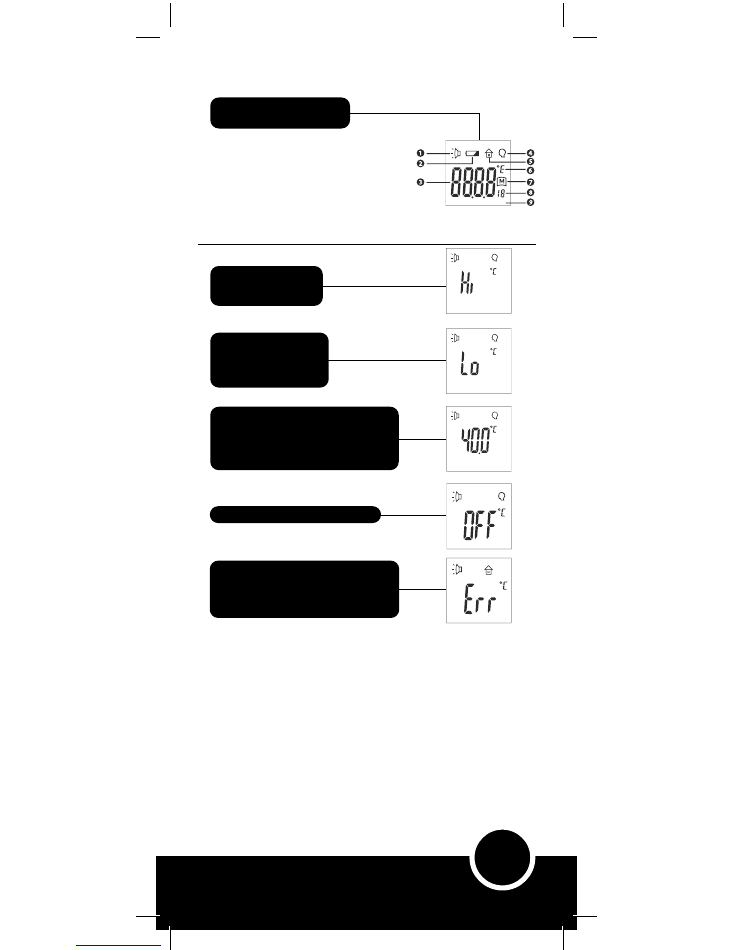
www.brothermax.com
9
Screen Display
Displays for 1 second when
thermometer is turned on
In forehead mode -
Temperature is above
maximum range
In forehead mode -
Probe out of range
of forehead or
temperature is below
minimum range
When reading a child’s temperature,
if display shows 40ºC or 104ºF
or more, consult your doctor
immediately
Unit is switching to auto OFF mode
If room temperature is higher than
40ºC or lower than 16ºC, the screen
will display ‘Err’ when you take
temperature
1.
Sound
2.
Battery level
3.
Temperature
4.
Forehead (Body) temperature mode
5.
Ambient (Room) temperature mode
6.
ºCelsius / ºFahrenheit
7.
Memory function
8.
Memory number
9.
Backlight (green)
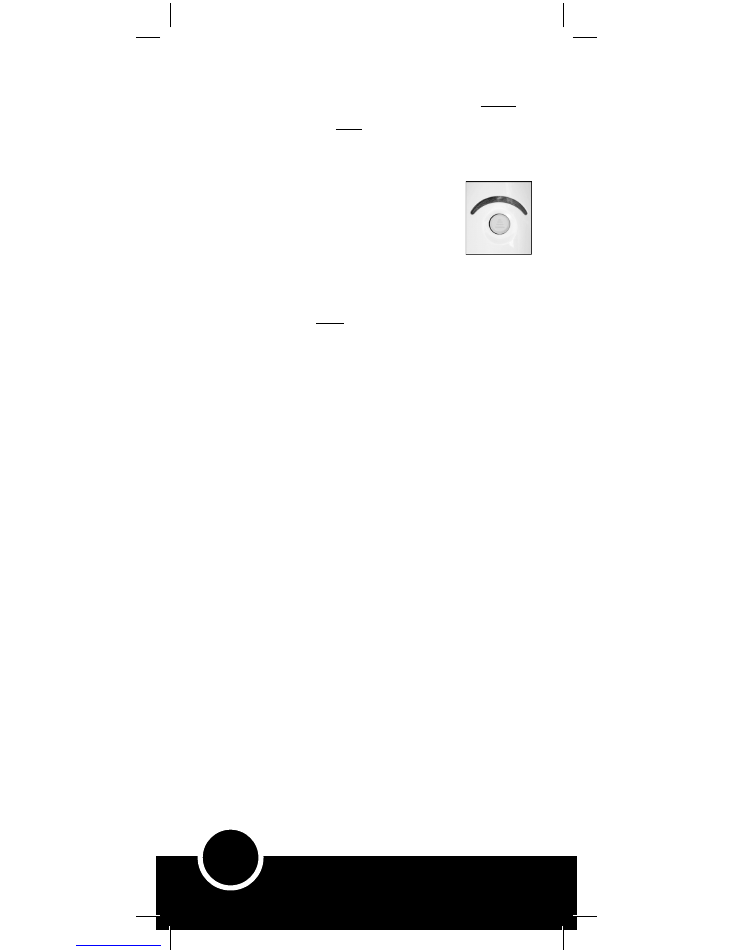
www.brothermax.com
10
How to Use the Thermometer
1 When Using Thermometer for the 1
st
Time:
• Open the battery compartment by carefully lifting up Battery Cover
where indicated (refer to ‘Battery Power and Replacement’) so as
not to scratch or damage cover.
• Insert 2 x AAA batteries
in the direction illustrated
inside the
battery compartment.
• Replace the Battery Cover.
• Turn on and use thermometer as described below.
Note: If the batteries have been inserted the wrong way, the thermometer will
not work and the handle might warm up, in which case immediately remove the
batteries (to prevent damaging the thermometer) and re-insert.
2 Switching Thermometer ON:
• The thermometer can be switched ON in either mode – Forehead or
Ambient.
• Start by briefly pressing ‘Power On /Scan button’ which turns on the
thermometer.
• All icons will display on the screen for 1 second followed by a short
beep indicating that the thermometer is now ready to use.
• The screen is also backlit for 10 seconds and the display will now
show the last setting memory data i.e. last temperature reading
and mode. This will remain until either a temperature is taken, the
thermometer turns off or the temperature mode is changed.
3 Switching Thermometer OFF:
• Without any operation for 30 seconds i.e. left idle, the thermometer
will automatically turn OFF. This is a power-save feature.
Temperature Range Indicator
The Temperature Range Indicator is an additional indication of the
patient’s temperature. Whilst the Display Screen advises the specific
temperature, the Temperature Range Indicator provides a quick visual
reference of the temperature range by utilising a traffic-light system of
green, orange or red.
If the Temperature Range Indicator (Fig. 1) displays:
• Green = the measurement is within the average
normal temperature range (of ≥36.3ºC to ≤37.3ºC)
• Orange = the measurement is within the average
raised temperature range (of ≥37.4ºC to ≤37.9ºC)
• Red = the measurement is in the average high
temperature range (of ≥38.0ºC)
Note: Since the above temperature ranges are averages, refer to page 5 for
normal temperature ranges by age.
Fig. 1

www.brothermax.com
11
4 Switching Between Forehead and Ambient Modes:
• The screen will display either a Forehead or House icon to indicate
which temperature mode it is currently in, and will also display the
last forehead or ambient temperature taken.
• If it is in Forehead mode but you want ambient mode or vice versa,
press the Function mode button and this will change the display
icons and a short ‘beep’ will sound to confirm the change.
5 Measuring Ambient (room) Temperature:
• Once in Ambient mode, briefly press the Power ON / Scan button
and keep the thermometer in the same position until a beep sounds,
which indicates the measurement is complete. Then read the
temperature on the screen.
6 Measuring Forehead Temperature:
• When in Forehead mode, aim the thermometer at the forehead,
ensuring that the distance between the probe and forehead is
between 2-5cm, and then briefly press the Power ON/Scan button.
Keep the thermometer in the same position until a beep sounds,
which indicates that measurement is complete.
• The specific temperature will appear on the screen, and the
Temperature Range Indicator will give the additional quick visual
reference of the temperature range.
Note: There is no need to keep your finger pressed on the Power ON / Scan
button to take a reading. In fact keeping your finger pressed on the Power ON /
Scan button will prevent the temperature from being read, so always press it
briefly, but keep the thermometer in the same position until the beep sounds.
• Immediately after the measurement process (in either mode),
both the Display Backlight and Temperature Range Indicator will
automatically come on and remain on for 10 seconds.
7 Switching Between Celsius and Fahrenheit:
The Celsius/Fahrenheit button can be found in the battery compartment.
With the device turned on, briefly press C/F button to convert between Celsius
and Fahrenheit. The screen icon and temperature will change and a beep will
sound to confirm this change.
8 Memory Function:
• With the thermometer ON, press the ‘M’ Memory Function button
to display the previous 19 readings. Press once for the last reading
data, press again for the second but last reading data and so
on. The data displayed will be the number of the reading, the
temperature mode and the actual temperature measurement.
9 Turning Sound ON or OFF:
• With the thermometer ON, press the Sound button to turn the
device audible sound ON or OFF.
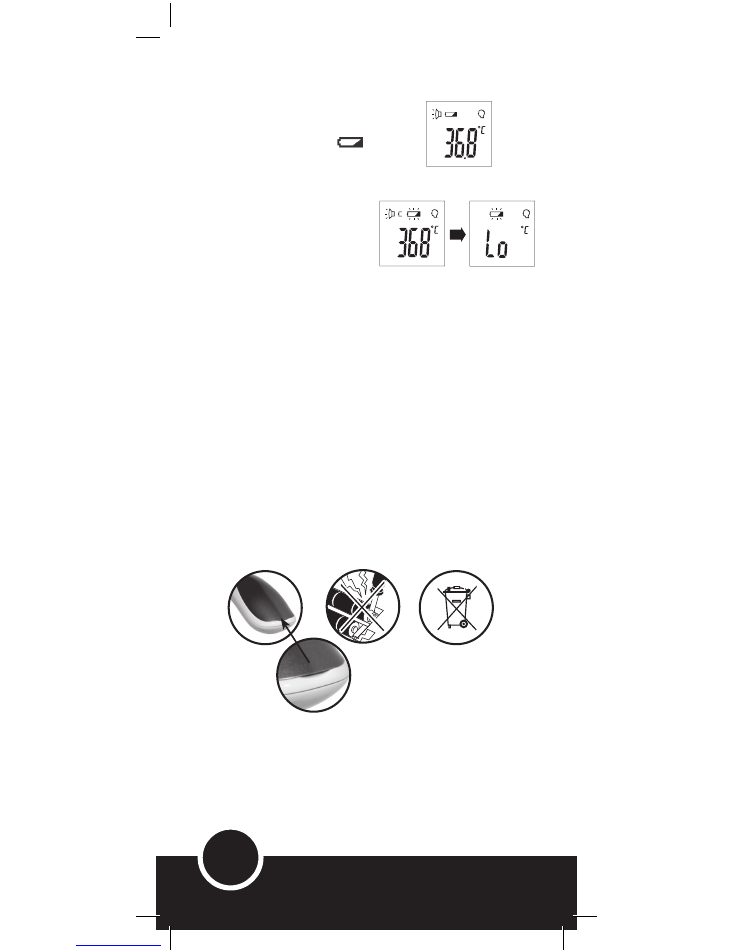
www.brothermax.com
12
Battery Power and Replacement
• Every time the thermometer is turned on
it will detect the battery life.(Fig. 2)
• Replace both batteries when the screen
shows the low battery icon.
• It is not recommended to let the batteries get
VERY LOW to ensure there is always sufficient
power available to take temperature.
• When the batteries get VERY LOW,
‘Lo’ will appear on the screen (Fig. 3)
and the battery icon will flash 3
times before the thermometer turns
itself off.
• To change the batteries, open the
battery compartment by carefully
lifting up Battery Cover where indicated
(Fig. 4) so as not to scratch or damage
cover, remove old batteries and replace
with 2 new AAA batteries.
Battery Safety Guidelines
• If the batteries have been inserted the wrong way, the thermometer
will not work and the handle may warm up, in which case immediately
remove the batteries (to prevent damaging the thermometer) and
re-insert correctly.
• The supply terminals are not to be short circuited, so do not
interfere with the metal contacts in the battery compartment
(Fig. 5).
• Help the environment by disposing of all products responsibly.
The wheelie bin symbol (Fig. 6) indicates the product and
batteries must not be disposed of in the domestic waste as they
contain substances which can be damaging to the environment
and people’s health. Please use designated collection points or
recycling facilities when disposing of the device or batteries.
Note: Please comply with local guidelines or regulations if discarding the
batteries or any part of the thermometer and its packaging.
Remove empty batteries from product to prevent corrosion.
The enclosed batteries are non-rechargeable although rechargeable batteries can
be used.
Batteries should be inserted with correct polarity.
Do not mix old and new batteries.
Fig. 4
Fig. 5
Fig. 6
Fig. 3
Fig. 2
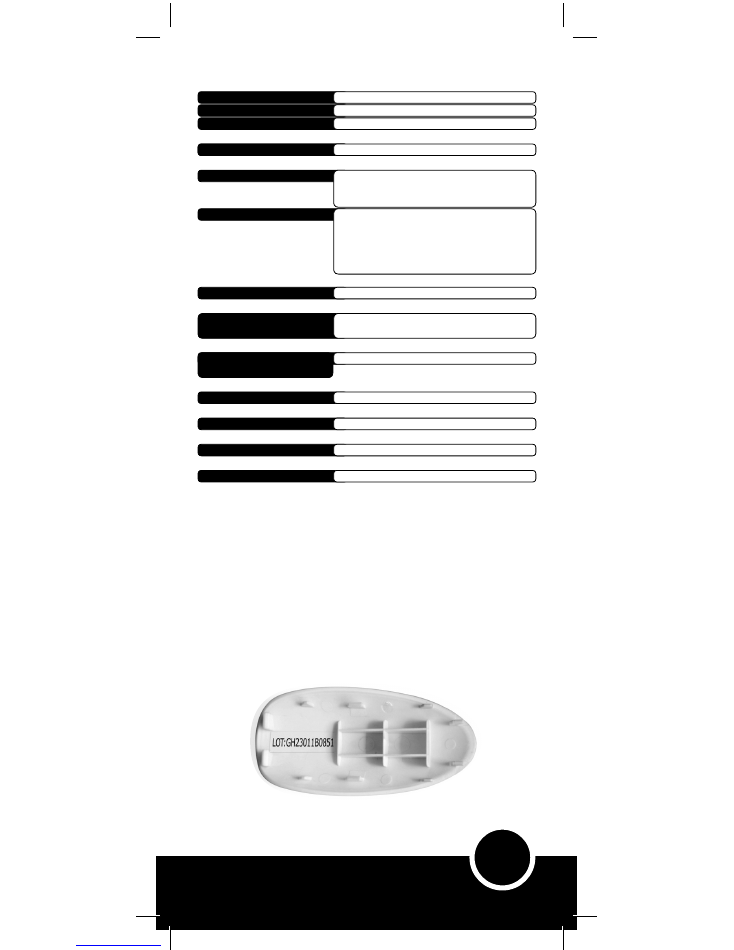
www.brothermax.com
13
Product Specification
Device name
Model No.
Measurement modes
Power Supply
Screen Display Measuring range
Accuracy
Clinical repeatability
Operational environment
temperature for Forehead (Body)
Storage Environment
Temperature
Screen Display precision
Measuring Distance
Weight
Dimensions
Non-Contact Forehead & Room Digital Thermometer
BM 70933
Forehead (Body), Ambient (Room)
3V DC, 2 x AAA batteries
Forehead (Body): 32.0 – 42.9°C (=89.6 – 109.2°F)
Ambient (Room): 15.0 – 40.0°C (=89.0 – 104.0°F)
Forehead (Body):
±0.2°C (= ±0.4°F) 36.0 – 39.0°C (=96.8 – 102.2°F)
±0.3°C outside the above range
Ambient (Room):
±1.0°C (= 1.4°F)
Forehead (Body) ± 0.3°C
16.0°C – 40.0°C (=60.8 – 104.0ºF) 20% – 80%RH
–20.0 – 55.0°C (= – 4.0 – 131.0°F) 20% – 95%RH
0.1°C (=0.1°F)
2cm – 5cm from forehead
109.5g
154 x 47 x 37mm
Manufacturing Date:
• Manufacturing date is indicated by the LOT number located on the
inside of the Battery Cover (see Fig.7). To interpret the LOT number
as an actual date, look at just the first two letters whereby the first
letter is the year and the second letter is the date, whereby:
1
st
Letter
G = 2013
H = 2014
I = 2015 etc.
2
nd
Letter
A = January B = February
C = March etc.
• So, in the example shown in Fig.7 where “GH” is stated, the
manufacturing date is August 2013.
Fig. 7
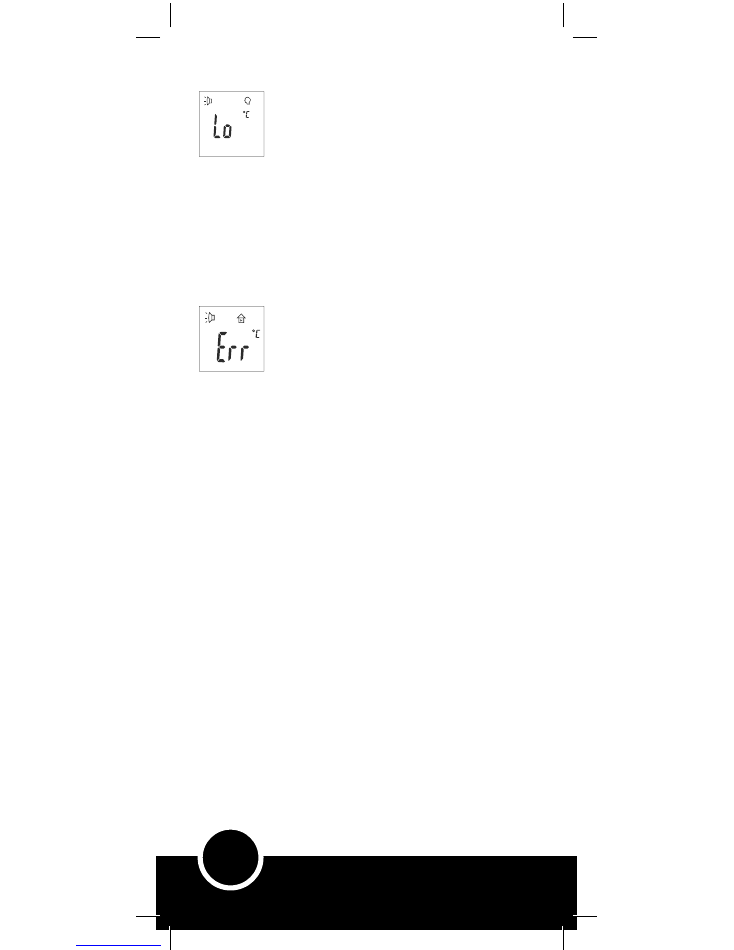
www.brothermax.com
14
Error Messages:
Reason:
1.
Temperature reading hampered by hair,
perspiration or environmental conditions such as
exposure to cold or air flux.
2.
The measuring distance is too far.
Solution:
1.
Ensure there is no obstruction prior to taking
temperature and there is no air flux (such as breeze
of wind).
2.
Sitting next to a cold air conditioning unit or
hot radiator will directly interfere with Forehead
temperature.
3.
Adhere to the measuring distance (2
–
5cm).
Reason
:
1.
Ambient (Room) temperature is not within the
operating range (16.0 – 40.0°C or 60.8 – 104.0°F).
2.
The sensor or thermometer is damaged.
Solution:
Allow the thermometer to adjust to the room
environment by remaining in a room for 30 minutes
at the correct operating range temperature before
taking a temperature.
If not caused by out of range room temperature
then stop using and please contact us (see ‘Further
information’).
Compliance:
• This infrared thermometer device complies with the requirements of
the Medical Device Directive 93/42/EEC.
Calibration:
• This infrared thermometer device is initially calibrated at the time
of manufacture.
• If the thermometer is used and cared for according to the instructions
in this user manual, periodic re-adjustment is not required.
• If at any time you question the accuracy, contact Brother Max.
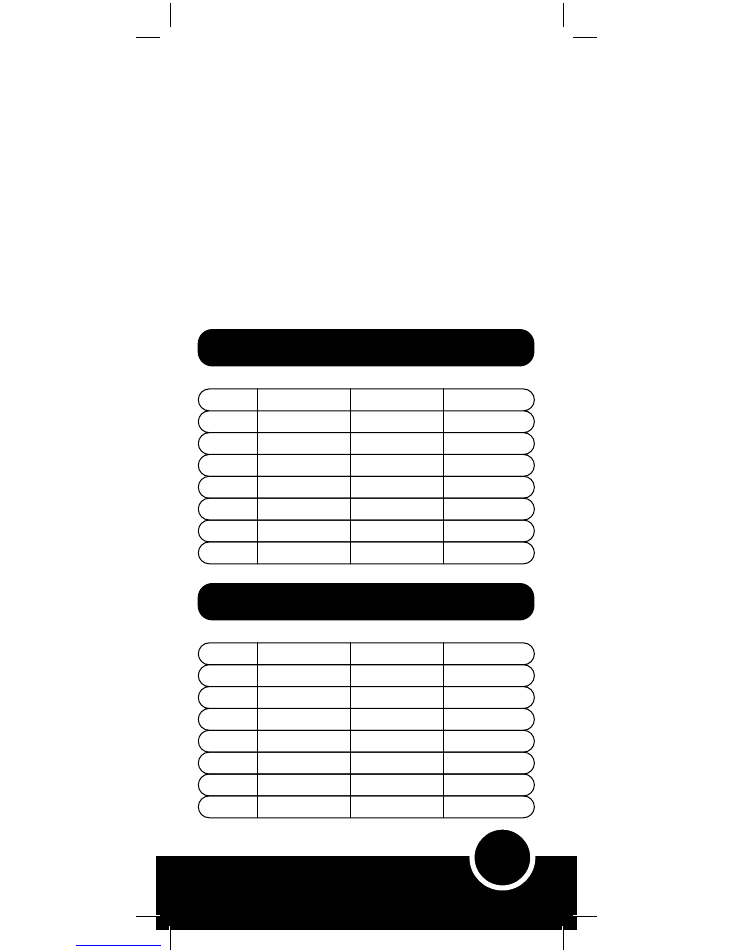
www.brothermax.com
15
Your Family Members’ Normal Temperature Range
Whilst normal temperature ranges by age are shown on page 5 of
this manual, every member of the family will have a slightly different
‘normal’ temperature range.
So it’s a good idea to build up a picture of those normal ranges for each
member of the family using your regular thermometer, no
matter what type or brand of thermometer you use.
This will help you and your medical practitioner when a family member is
unwell as you will have a far more reliable benchmark to compare against.
To do this, take temperature readings for each member of your family:
• At three different times of the day, such as 8am, 1pm and 6pm, but
always with at least five hour intervals;
• Over five different days;
• Always from the same body part;
• Always using the same thermometer;
• Always in the same room in your home.
Notes: Do not self-diagnose.
The use of any thermometer is not intended as a substitute for consultation with a
physician. If the temperature of a child under 6 months old reaches 40.0°C / 104.0°F
or more, consult a doctor immediately. Note that this danger level drops the older
the patient becomes.
°
C /
°
F
°
C /
°
F
°
C /
°
F
°
C /
°
F
°
C /
°
F
°
C /
°
F
°
C /
°
F
°
C /
°
F
°
C /
°
F
Our family members’ normal
temperature range: Forehead
Family Member's Name:
°
C /
°
F
°
C /
°
F
°
C /
°
F
°
C /
°
F
°
C /
°
F
°
C /
°
F
°
C /
°
F
°
C /
°
F
°
C /
°
F
°
C /
°
F
°
C /
°
F
°
C /
°
F
Date: 08:00 13:00 18:00
°
C /
°
F
°
C /
°
F
°
C /
°
F
°
C /
°
F
°
C /
°
F
°
C /
°
F
°
C /
°
F
°
C /
°
F
°
C /
°
F
Our family members’ normal
temperature range: Forehead
Family Member's Name:
°
C /
°
F
°
C /
°
F
°
C /
°
F
°
C /
°
F
°
C /
°
F
°
C /
°
F
°
C /
°
F
°
C /
°
F
°
C /
°
F
°
C /
°
F
°
C /
°
F
°
C /
°
F
Date: 08:00 13:00 18:00
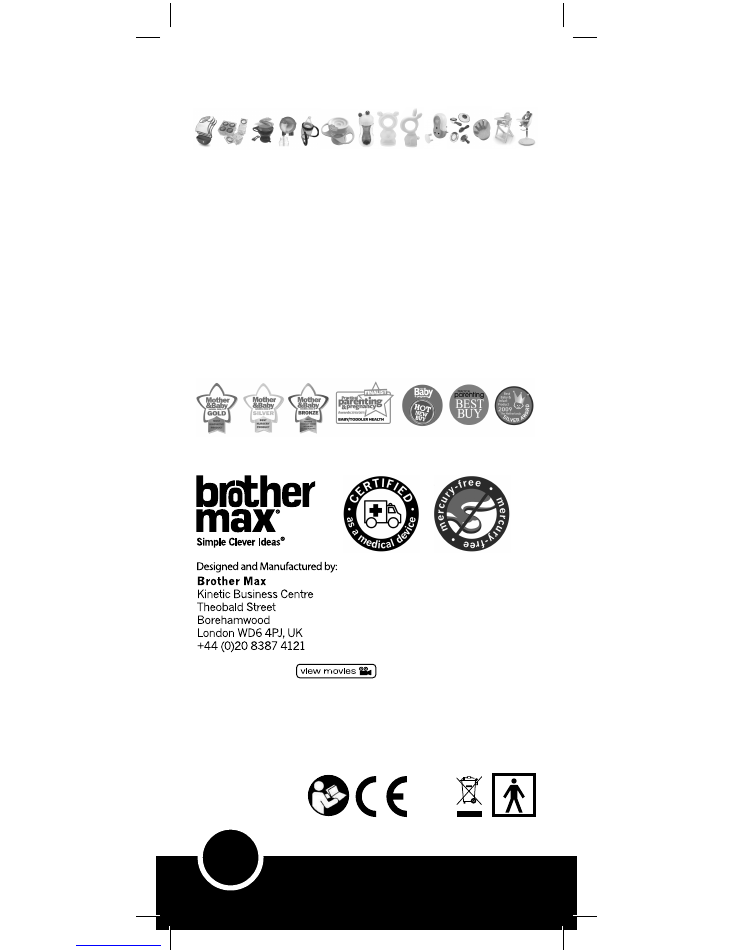
www.brothermax.com
16
Other Products in our Range
We have over 50 products in our range, including:
Visit
www.brothermax.com
for further information
Further Information
If you have any questions about, or problems with, your thermometer,
please get in touch with us (see below for contact details).
For more information on this and all products in our range, including
movies demonstrating the features, benefits and maintenance of this
product, visit
www.brothermax.com
We’d really like to hear from you. We want to know what you like and
how our products could make your life even easier or happier. We want
to know if you have a parenting challenge that you need a
solution for, or a product that you find frustrating. Don’t be shy, drop us
a line at
family@brothermax.com
Please retain our address and packaging for future reference
Brother Max, Simple Clever Ideas® and Inspired by Family® are registered trade
marks. © and Designright 2012/13 Brother Max. Worldwide registered designs and
patents granted and pending.
Product Code:
BM70933
Version 1.0
To see more and to
of all our products visit
www.brothermax.com or drop us a line at family@brothermax.com
31mm
14.3mm
0473
Non-contact Infrared Forehead Thermometer
Model: BM 70933
Power: DC 3V, 2 x AAA batteries
Manufacturer: Brother Max Ltd
IP22